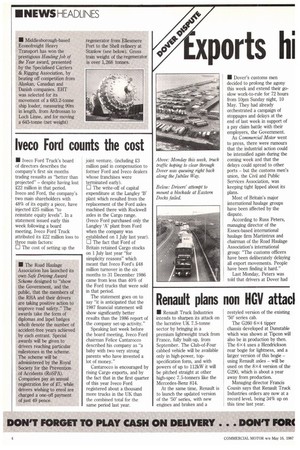Iveco Ford counts the cost
Page 6

If you've noticed an error in this article please click here to report it so we can fix it.
• Iveco Ford Truck's board of directors describes the company's first six months trading resuslts as "better than projected" — despite having lost £22 million in that period. Iveco and Ford, the company's two main shareholders with 48% of its equity a piece, have injected £25 million "to reinstate equity levels". In a statement issued early this week following a board meeting, Iveco Ford Truck attributed its 222 million loss to three main factors: 0 The cost of setting up the joint venture, (including £3 million paid in compensation to former Ford and Iveco dealers whose franchises were terminated early).
0 The write-off of capital expenditure at the Langley 'B' plant which resulted from the replacement of the Ford axles machined there with Rockwell axles in the Cargo range. (Iveco Ford purchased only the Langley 'A' plant from Ford when the company was established on 1 July last year). 0 The fact that Ford of Britain retained Cargo stocks on 1 July last year "for simplicity reasons" which meant that Iveco Ford's £48 million turnover in the six months to 31 December 1986 came from less than 40% of the Ford trucks that were sold in that period.
The statement goes on to say "it is anticipated that the 1987 financial statement will show significantly better results than the 1986 report of the company set-up activity."
Speaking last week before the board meeting, Iveco Ford chairman Felice Cantarocco described his company as "a baby with two very strong parents who have invested a lot of money."
Cantarocco is encouraged by rising Cargo exports, and by the fact that in the first quarter of this year Iveco Ford registered about a thousand more trucks in the UK than the combined total for the same period last year












































































